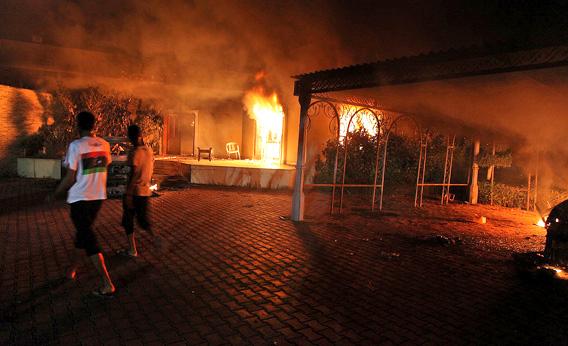
A vehicle and the surround buildings burn after they were set on fire inside the U.S. consulate compound in Benghazi, Libya? late on Tuesday.
Photo by STR/AFP/Getty Images.
The story has just begun. We don?t yet know its contours?whether it will unfold as a one-shot tragedy or as the opening salvo of a monumental crisis. But less than a full day after the violent assault on the U.S. embassy in Egypt and the killing of our ambassador and three of his staff in Libya, a few lessons can be noted.
First, diplomacy still matters, perhaps above all else. Hillary Clinton reported this morning, in her most eloquent news conference as secretary of state, that Libyan citizens and security forces had tried to fight off the small mob of militants who set fire to the U.S. consulate in Benghazi and that, afterward, they?d sheltered many survivors and carried the ambassador, J. Christopher Stevens, to a nearby hospital. They did this, in good part, because they knew Stevens. A year ago, as the U.S. emissary, he had helped the rebels?who now form Libya?s fledgling democratic government?in their fight to overthrow Muammar Qaddafi. Ever since, he?d been greeted as a friend in his travels around the country.
Similarly, Clinton said, Egyptian security forces helped American guards stave off those who stormed the U.S. embassy in Cairo before much damage was done. Though she didn?t mention it, the new president, Mohamed Morsi, must know that his country?s fortunes, and thus his own political prospects, depend on foreign aid and investment. A few days earlier, Morsi had met with American businessmen and tried to assure them that the climate for investment was sound. Nobody will believe this message if he can?t guarantee the security of foreign embassies on Egyptian soil?or prosecute those who violate their sovereign status.
Second, what we?re seeing is, potentially, a conflict not only between the West and radical Islam but also between elements within Islam. Obama has dispatched 200 Marines to beef up security at other embassies in the region, a sensible move. But beyond that, he and his aides no doubt know that, in the long run, it?s important for President Morsi, Libya?s leaders, and at least a few other prominent Muslim spokesmen throughout the region to denounce the most violent of these protesters?and to denounce the very tactic of assaulting embassies and killing diplomats as an antiquated practice that violates their principles and has no place in contemporary Middle Eastern politics.
Getting them to do this will be a delicate task, requiring a fine mix of pressure (no more IMF loans or business investment if you don?t control the violence?not a threat, just a fact of what will happen) and incentives (the money and much else will flow if you get on the right side).
A major obstacle here is that domestic politics suffuses every pixel of this picture. Morsi and the other Muslim leaders are in a bit of a bind. The militants form a segment of their constituencies; many others may oppose the militants? action but regard the American-made anti-Islamic movie that inspired the protest as more repellent still. Morsi issued a statement demanding that the U.S. government prosecute those who made the movie. Obviously, this is not going to happen. It is very hard to convince foreigners, especially those who grew up under authoritarian regimes, that America is not a monolithic society. The notion that some idiots and ideologues can make and release a movie without getting some stamp of approval from the government strikes them as literally unbelievable.
One task ahead is to persuade these leaders that this really is the way things work here, that we value free speech, even stupid free speech?while still expressing some sympathy with their concerns (and understanding that they might not want to adopt the same system). This is a long-term task, one that requires?and will evolve in tandem with?the integration of their societies into the rest of the world: economically, socially, and, to some extent, culturally. The major challenge is that this integration is precisely what the militant protesters most oppose. If the events of the last 24 hours prove pivotal, it will be because they forced the Muslim leaders to choose which path they want to follow.
Source: http://feeds.slate.com/click.phdo?i=b06e729c984e3e76a0240549babb8fa5
mount rainier national park drop dead gorgeous ticket city bowl 2011 nfl playoff schedule cowboys vs giants ndaa timberwolves
কোন মন্তব্য নেই:
একটি মন্তব্য পোস্ট করুন